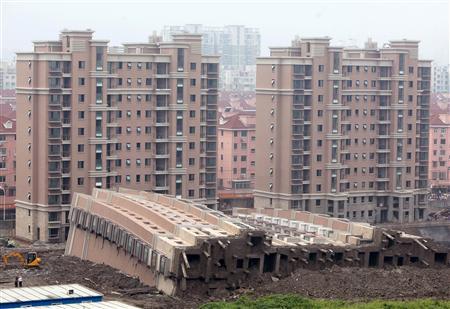
1) China's RE bubble is in trouble. This is critical for us here in BC. This guy says..'get out of China'.

The fact remains that retiring at 55 in today's world seems a waste. The mortality age for Malaysians has risenSince when the definition of wastage of my retirement is up to anyone else to say ? I may live longer and what is that got to do with you holding my money longer than you have promised before ?
The retirement age in Indonesia and Thailand is 60No one stop you to migrate there. But right now the hot thing going is 1 Malaysia where all we talked about is how much we love our own land bla bla bla.
A longer life based on a finite and short working career certainly would put a strain on the finances of many a retiree.and therefore we don't give them money at the time when they are suppose to be ? Since when delaying giving money can help a financially strain guy ?
73% of contributors have less than RM50,000 savedSo most of us are poor, and you want to solve it by NOT giving us our own money ?
the more workers a country retains as the population ages the more the benefit to the economyYes, wisdom and experience are invaluable. What has that got to do with delaying paying us our money ? All the wise old men never stop doing something anyway through out their whole life.
Based on life cycle hypotheses, people tend to spend more during the early age of their careers and save more as retirement approaches.I am sure he just cook that sucker hypotheses up when he was drunk written that article. People who have gone through most parts of their any life cycles knows that singles tends to save more (30-50%) than later years of loans, family and kids etc. The middle income trap ( rat race ) clearly says that the more we earn, the less we have.
Now that they know retirement is postponed for five more years at least, those people who might be thinking of building a nest egg have the opportunity to spend. Spending more now will certainly be a boost to domestic consumption which is a main driver of growth.
it will be illogical to have separate retirement ages for the public and private sectors.Since when it is logical to make them the same ? What is the difference between them then ?
other benefits the Government can save on such as healthcare billsHuh ? People who continue working has no healthcare or people who retire has no healthcare ? Are you suggesting another bigger problem here ?
Young people who might be worried about not moving up the ladder or getting a job should not.What has that got to do with not paying the old people the money they were promised ? Old people don't get paid and young people should be happy !?!?
remove all unproductive workers, you can bet others will emerge at later years. It's best that talent management is exercised to ensure such workers are minimised at all times.Why hasn't EPF office exercise talent managment then ?

According to the BCREA survey, the average price in B.C. rose 10.7 per cent in August compared to August 2010 to $540,000 from $488,000.
However, price changes fluctuated sharply by region, with the Fraser Valley showing the sharpest increase of 19.7 per cent over the year, from $424,000 to $508,000.
Metro Vancouver prices rose 14.4 per cent from $681,000 to $779,000, while Victoria prices rose 13.7 per cent from $472,000 to $537,000. The rest of Vancouver Island showed a slight price drop.
However, Powell River showed the sharpest drop - 12.7 per cent, from $297,000 to $260,000 - while the Okanagan Mainline recorded a 0.3-per-cent drop in prices from $384,000 to $383,000 and the South Okanagan dropped 7.2 per cent from $331,000 to $307,000.
Year-to-date, it was more of the same, with B.C. recording a 14.7-per-cent price increase in the first eight months compared to the same period in 2010, Metro Vancouver recording a 19.2-per cent hike over that period and the Fraser Valley seeing a 12.6-per-cent increase.
However, the Okanagan Mainline saw a 2.5-per-cent decline in the six-month period and the South Okanagan recorded a 5.4-per-cent drop in prices.
Powell River saw an eight-per-cent drop in the six months, while Victoria recorded a 0.5-per-cent decline in the average price.
The Kootenay region recorded a 4.4-per-cent increase in August compared to August 2010, from $274,000 to $286,000, although the average price fell 3.5 per cent year-to-date.
Current housing prices in Toronto, Vancouver, Montreal and Calgary are difficult to rationalize using any combination of fundamental metrics. As history shows, this leads to a price correction. The disparity between gains in income, growth in rental rates and home prices in Canada is quite apparent.
Over the last 13 years, growth in home prices substantially outperformed all other components. From the fundamental price-to-rent perspective, real-estate as an investment no longer represents an attractive asset. In fact, at the current home prices in major Canadian cities, renting an apartment makes more financial sense than owning it. This market state leads to an array of predictable consequences. For instance, renting a property out now requires a substantial subsidy by the home owner, which effectively eliminates renting out as a contingency measure in case of income loss.
..............
The price-to-income ratio in Canada is at a historically high level. In fact, in some cities it is the highest on record. Over the last 13 years home prices have become decoupled from homeowners income, the mean household income has risen by 23 to 32 percent in the four largest Canadian cities.
Over the same period, the average house prices in these cities increased between 100 and 200 percent. Based on the price-to-income ratio, the four major Canadian cities experienced growth comparable to that of the hottest spots of the US housing bubble. Yet, the US bubble burst, but home prices in Canada remained around these tremendously high levels.
..................
Affordability in Canada is approaching historically high levels. In Vancouver, the housing affordability index exceeded the peak of the latest housing bubble of the late 80s. Adjusted for interest rates, the current affordability index in other Canadian cities is at par or above the peak of the late 80s bubble. If interest rates went up to the historical average, average households in Toronto and Vancouver would be paying 100 percent or more of their gross income towards ownership costs.
.................
On the median multiple ratio measurement, Vancouver (9.3), Toronto (5.2), Montreal (4.9), and Calgary (4.6) hover substantially above the “normal” 3.0 level. Based on this valuation, Toronto is considered a “severely unaffordable” city, while Montreal and Calgary lie on the border between being “seriously unaffordable” and “severely unaffordable”. Vancouver prominently stands out even from this crowd: it is not just “severely unaffordable, but it is also the least affordable city in Canada, the US, UK, Ireland, Australia and New Zealand.
..................
There are three main triggers that may help to set off the housing market decline. They are: HST, Olympics and rising rates
...
The whole piece is worth reading. But basically he says the triggers could be quite minor.
Eg the end of the construction boom linked to Olympics and the public debt problems that come out of it
Or a small rise in rates.
Or the advent of HST which has pulled demand forward (often due to confusion) and left a drop off that follows
He stated that all three were likely events in 2011.
Well I think he has been partially right. Bubbles are impossible to time and the 'trigger' for the burst is usually not what one would have expected.
Eg we have had the post Olympic drop in public spending, but the Government has kept the build-out going. Also the main hang-over (the Olympic Village) seems to have been thrown around the neck of the City of Vancouver and not the Province.
Well done Mr Pestov for outlining it so clearly:
By postponing the bubble deflation, the bubble was inflated further. If a housing market collapse would have caused pain and distress on behalf of a large and overleveraged Canadian population in 2007, the housing crash of 2011 will affect all the same buyers, plus many more of those who were sacrificed to keep the prices going up. More fire sales and more competing properties on the sell side will cause a sharper and a deeper downturn that would have been experienced in 2007.
Furthermore, CMHC, the second largest crown corporation in Canada, would require a bailout due to all the risky sub-prime mortgages it has insured. Every single one of the main sub-prime lenders in the US went out of business or required a massive bailout2. Unlike the US, the Canadian sub-prime lender would not require a bailout. In Canada, the bailout is already embedded in the system. It would simply be passed on to tax payers in the form of a larger national debt, higher taxes or tighter funds for social programs.
......
That last sentence explain why we are ALL in for a very difficult time when this bubble bursts. The Government has already committed to the bail-out! The only thing that remains to be decided is when and how much we all pay.
 As the BC Premier quite clearly stated in her job's initiative, she is looking to Asia for growth and more investment.
As the BC Premier quite clearly stated in her job's initiative, she is looking to Asia for growth and more investment.


